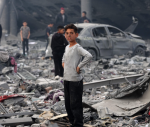You are here
What to do about Daesh
May 26,2016 - Last updated at May 26,2016
“ISIS [Daesh] is not an existential threat to the United States,” President Barack Obama told Jeffrey Goldberg of the Atlantic magazine recently.
What becomes clear in that long article, much of it Obama’s own words, is that Obama shies away from the idea that war can make bad things good.
The unquenchable wars that he inherited — Iraq and Afghanistan — were set alight by his predecessor, George W. Bush, and no amount of Obama fire engines have been able to douse them with enough water to put them out.
As for the rest of foreign affairs, he argues that after a period of uncertainty, he decided that the US should not get militarily involved in the civil war in Syria.
He decided that Ukraine is not a core American interest, although it is a Russian one, and he was convinced that Iran would agree through peaceful negotiation to renounce the dangerous parts of its nuclear programme.
As for the toppling of president Muammar Qadhafi and the mess that followed. he agrees that he made a bad mistake when he put aside his philosophy of not intervening militarily in a situation that was not a core US interest.
In the Atlantic article, Obama says he believes he broke with what he calls, derisively, the “ playbook”.
“It’s a playbook that comes out of the foreign-policy establishment. The playbook prescribes responses to different events, and these responses tend to be militarised.”
So if Daesh is not an “existential threat”, what is it and why have American bombers been deployed against it and even some special forces on the ground?
Why is he sounding the trumpet of war — limited war, it must be admitted, but still war?
According to The New York Times, since September 2014, groups or individuals claiming some connection to Daesh have killed approximately 600 people outside Syria and Iraq.
Yet more than 14,000 people were murdered in the US in that same period. Indeed, if 600 is the best Daesh can do, the US and its NATO allies should switch off the lights in the Middle East and go home.
The US does not need the Middle East’s oil as much as it once did. It cannot straddle all the local players at the same time — Saudi Arabia, Iran, Iraq, Turkey and the Gulf states are all pulling in different directions.
As James Baker, president George H.W. Bush’s secretary of state, said about the Yugoslav civil wars, “we haven’t got a dog in that fight”.
Daesh has limited power.
The Soviet Union could impose communism on Eastern Europe thanks to the might of its army.
Daesh, in contrast, has at the most 30,000 troops.
Alarmists point to the fact that it controls an area as large as the UK, but most of it is empty desert. Its national income is about the same as Barbados. Its base is the ungoverned Sunni areas of Iraq.
As Harvard professor of international affairs, Stephen Walt, writes in Foreign Affairs, “spreading a revolution via contagion requires a level of resources that only great powers possess. The Soviet Union was powerful enough to subsidise the Communist International and support client states around the world, but medium-sized revolutionary powers are no so fortunate. Iran has backed a number of proxies over the past 30-plus years, but it has not yet created a successful clone.”
Local Muslim governments are already working to contain Daesh’s influence by cutting down on the passage of foreign fighters, interrupting its financing and encouraging local religious authorities to challenge its outlandish religious claims.
In Europe, an overwhelming majority of Muslims will have no truck with Daesh. Imams are increasingly on the alert for Daesh propaganda and recruiting in their mosques.
Daesh leaders have quarrelled with Al Qaeda leadership; the former has a tendency to treat minor disagreements as acts of heresy punishable by death.
The US and its allies (and Russia) should beware of the boomerang effect.
Foreign intervention by Austria and Russia radicalised the French Revolution. Iraq’s invasion of Iran in 1980 allowed Ayatollah Khomeini and his followers to purge moderate elements in Iran.
Walt suggests “patient containment” as the best policy.
Daesh’s excesses and internal divisions could lead to its collapse. Or, over time, it may mellow.
The role that the US and its allies can play is back up, but not fighting, support for the front liners most affected by Daesh.
Also Western media and politicians should play its significance down. Ringing the alarm bells all the time plays into Daesh’s hands.












